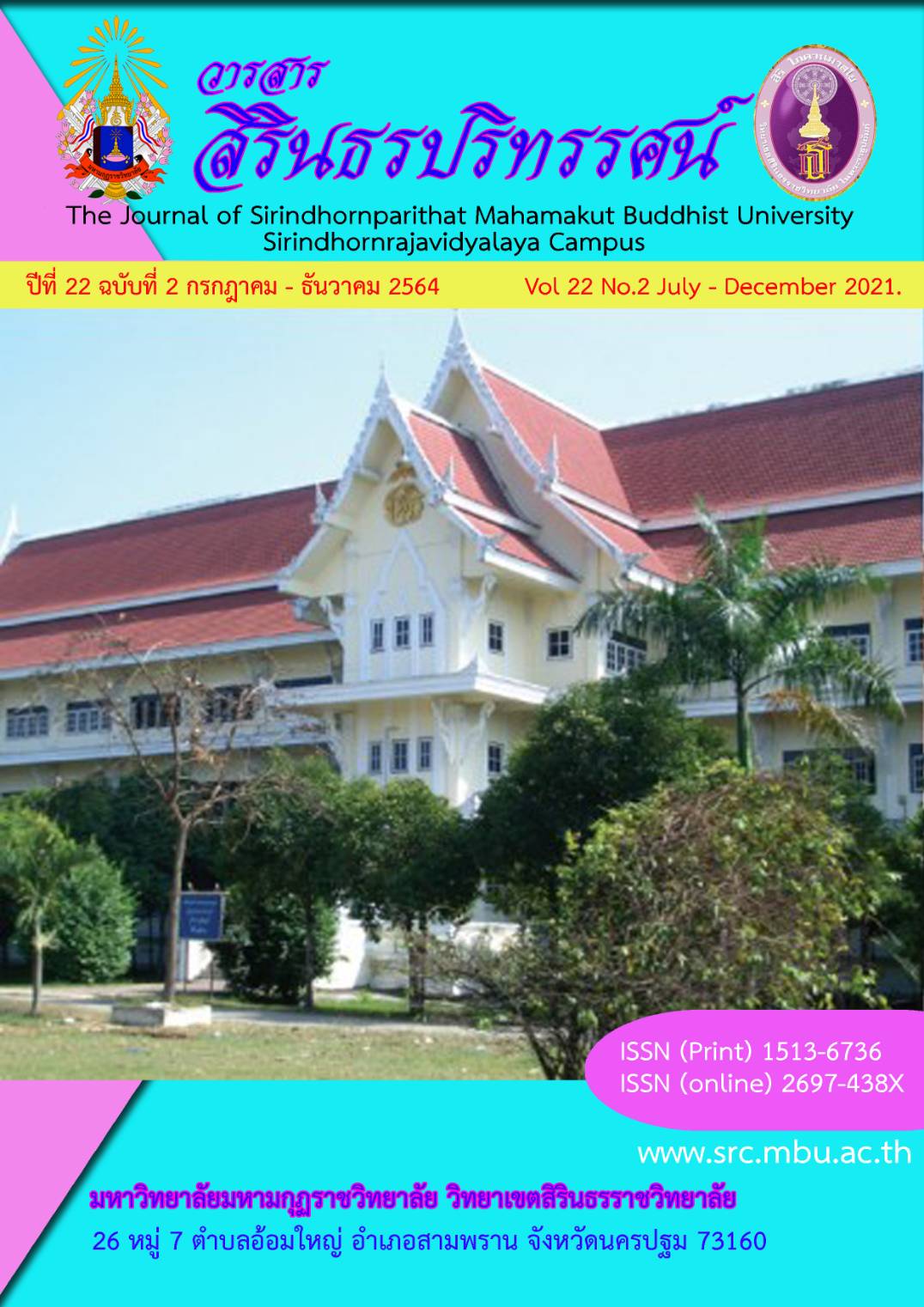TEACHINGS OF THE BUDDHA ON EMOTION MANAGEMENT FOR MENTAL HEALTH
Keywords:
Emotion Management, Resilience quotient, Mental healthAbstract
The goals of this article are to 1) learn about the meaning, features, and types of emotions, and 2) learn how to deal with them. Examine data from a variety of academic sources, including the Tripitaka, books, textbooks, scholarly publications, reviews, and related research. To present Buddhist concepts for emotional management in order to improve mental health. It entails correct life practice in four areas: Knowledge is the first step, followed by action, consumption, and problem solving. The Buddha's teachings include Parinya (the three full understandings), Brahmavihara (the four sublime states of mind), Mahasatipatthana (the four foundations of mindfulness), Indariyasangvarasila (the sense-control), Yonisomanasikara (the systematic attention), and Sammuppathana (the four right efforts). It is highlighted the need of mastering the three emotions of pleasure, pain, and neutrality. Starting with a fresh and original idea is a fantastic place to start. Using a checklist approach to monitor one's emotions in everyday life and writing down the benefits and downsides of such feelings for review, reflection, analysis, and positive and negative results, for example. as well as coming up with a solution based on Buddhist teachings or other ways that are fit for one's situation.
References
จันทิมา ฤกษ์เลื่อนฤทธิ์ ขวัญจิต คุปตานนท์ และนพพร ว่องสิริมาศ. (2554). กระบวนการจัดการทางด้านจิตใจและอารมณ์เพื่อการมีชีวิตที่ปกติของผู้มีภาวะหัวใจวาย. วารสารการพยาบาล, 26(4), 108-122.
ทวีศักดิ์ สิริรัตนเรขา. (2560, 16 พฤศจิกายน). อาร์คิว ภูมิคุ้มกันทางใจ. สืบค้นเมื่อ 22 ตุลาคม 2564, จาก https://www.happyhomeclinic.com/Download/article/a21-RQ.pdf
ทัศนีย์ เจนวิถีสุข. (2557). การสื่อสารเพื่อบริหารจัดการอารมณ์ตามแนวทางพระพุทธศาสนา. วารสารครุศาสตร์ปริทรรศน์ฯ, 1(1): 14-26.
ปัญญา ใช้บางยาง. (2548). ธรรมาธิบายหลักธรรมในพระไตรปิฎก. กรุงเทพฯ: ธรรมสภาและสถาบันบันลือธรรม.
พระพรหมคุณาภรณ์ (ป.อ.ปยุตฺโต). (2555). พุทธธรรม ฉบับปรับขยาย. กรุงเทพฯ: พิมพ์ครั้งที่ 36: ผลิธัมม์.
พระพรหมคุณาภรณ์ (ป.อ.ปยุตฺโต). (2559). พจนานุกรมพุทธศาสตร์ฉบับประมวลธรรม. (พิมพ์ครั้งที่ 34). กรุงเทพฯ: มูลนิธีการศึกษาเพื่อ
สันติภาพ พระธรรมปิฎก (ป.อ. ปยุตฺโต).
มหาจุฬาลงกรณราชวิทยาลัย. (2539). พระไตรปิฎกภาษาไทย ฉบับมหาจุฬาลงกรณราชวิทยาลัย. กรุงเทพฯ: โรงพิมพ์มหาจุฬาลงกรณราชวิทยาลัย.
ร่มตะวัน กาลพัฒน์ อังศินันท์ อินทรกาแหง และจรัล อุ่นฐิติวัฒน์. (2560). การศึกษาตัวแปรความผูกพันทางศาสนาและสัมพันธภาพที่ดีภายในครอบครัว. วารสารพฤติกรรมศาสตร์, 23(1): 187-204.
ศักดา ขำคม. (2561). ผลการใช้กิจกรรมกลุ่มเพื่อพัฒนาความฉลาดทางอารมณ์และพลังสุขภาพจิตของนักศึกษาพยาบาลศาสตร์ ชั้นปีที่ 1 มหาวิทยาลัยเทคโนโลยีสุรนารี. Veridian E-Journal, Silpakorn University , 11(2): 2767-2780.
สมรัก ครองยุทธ นุจรี ไชยมงคล และดวงใจ วัฒนสินธุ. (2560). อิทธิพลของทักษะชีวิตที่มีต่อภาวะสุขภาพจิตในวัยรุ่นตอนต้น. วารสารการพยาบาลและการดูแลสุขภาพ, 35(2): 54-62.
สุตาภัทร ประดับแก้ว และรุ่งระวี สมะวรรธนะ. (2558). ผลของโปรแกรมทักษะชีวิตที่มีต่อความสามารถในการจัดการอารมณ์ของนักเรียนชั้นมัธยมศึกษาตอนต้น. วารสารอิเล็กทรอนิกส์, 10(2): 308-321.
อรพินทร์ ชูชม สุภาพร ธนะชานันท์ และทัศนา ทองภักดี. (2554). ปัจจัยเชิงเหตุและผลของภูมิคุ้มกันทางจิตของเยาวชน. กรุงเทพฯ: สถาบันวิจัยพฤติกรรมศาสตร์ มหาวิทยาลัยศรีนครินทรวิโรฒ.
Kubala. K. (2021, June 6). How Can I Improve Emotional Intelligence (EQ)? Retrieved 22 October 2021, from PchychCentral: https://psychcentral.com/lib/what-is-emotional-intelligence-eq
Downloads
Published
Issue
Section
License
Copyright (c) 2022 Mahamakut Buddhist University

This work is licensed under a Creative Commons Attribution-NonCommercial-NoDerivatives 4.0 International License.
บทความที่ได้รับการตีพิมพ์เป็นลิขสิทธิ์ของ มหาวิทยาลัยมหามกุฏราชวิทยาลัย วิทยาเขตสิรินธรราชวิทยาลัย
ข้อความที่ปรากฏในบทความแต่ละเรื่องในวารสารวิชาการเล่มนี้เป็นความคิดเห็นส่วนตัวของผู้เขียนแต่ละท่านไม่เกี่ยวข้องกับหาวิทยาลัยมหามกุฏราชวิทยาลัย วิทยาเขตสิรินธรราชวิทยาลัย และคณาจารย์ท่านอื่นๆในมหาวิทยาลัยฯ แต่อย่างใด ความรับผิดชอบองค์ประกอบทั้งหมดของบทความแต่ละเรื่องเป็นของผู้เขียนแต่ละท่าน หากมีความผิดพลาดใดๆ ผู้เขียนแต่ละท่านจะรับผิดชอบบทความของตนเองแต่ผู้เดียว




